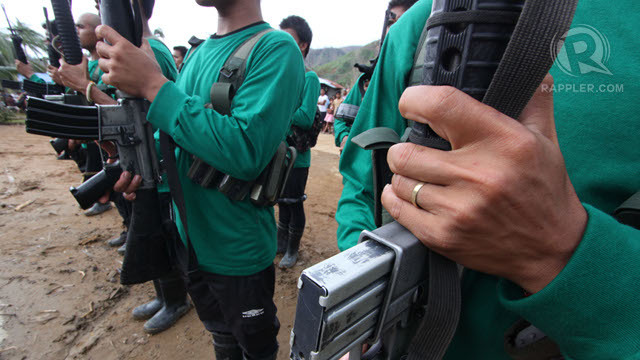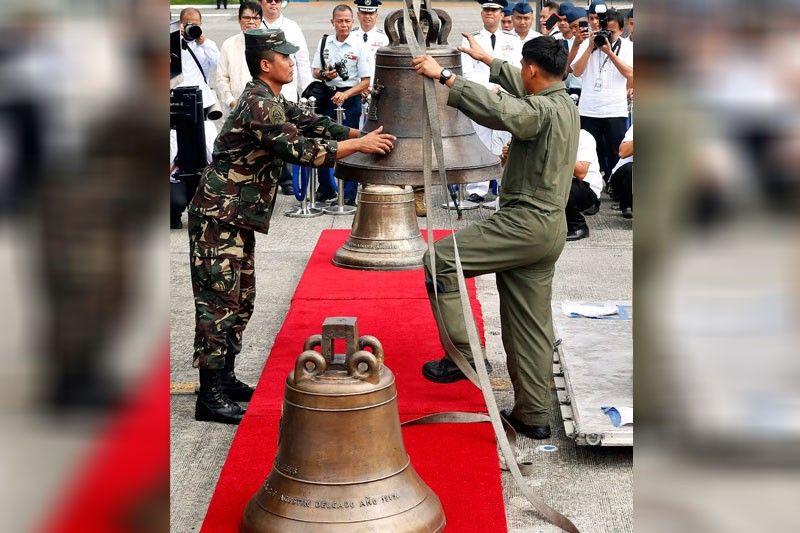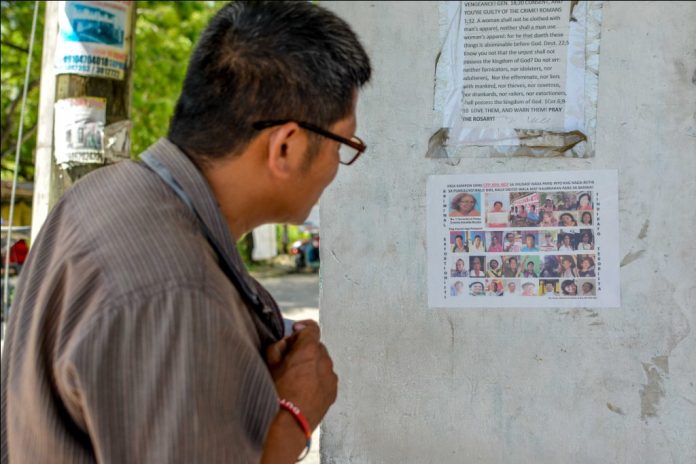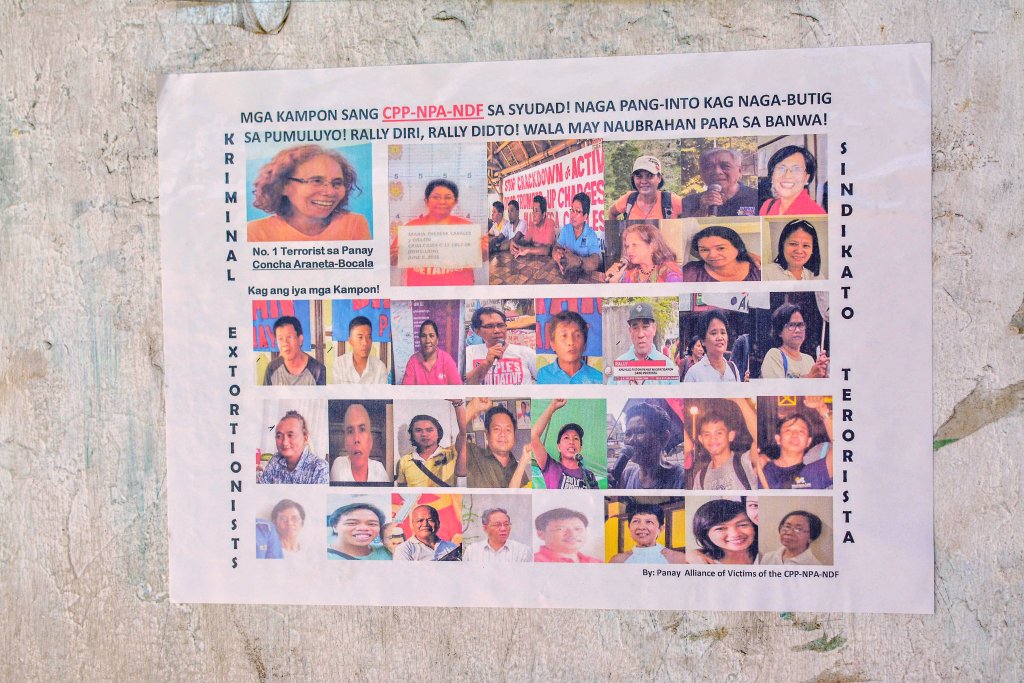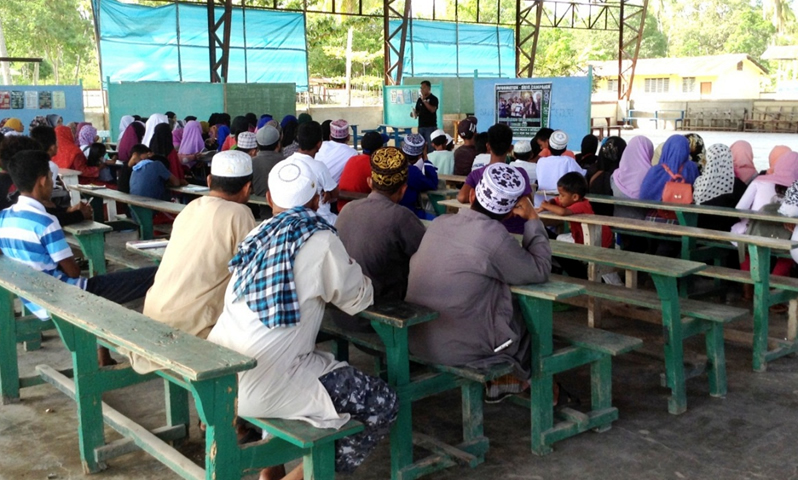From Rappler (Dec 12): In 2018,
Duterte turns to military for (almost) everything
With 2018 ending, Duterte's Cabinet is now one-third former military and police men. He has turned to ex-generals to 'fix' Boracay and soldiers to overhaul the Bureau of Customs.
Wearing camouflage uniform, President Rodrigo Duterte places his right hand lightly on the trigger of a Chinese-donated sniper rifle and uses its telescope to aim.
He is surrounded by soldiers of the Armed Forces’ Special Operations Command in Fort Magsaysay, members of the Presidential Security Group, and his aide, deftly taking a selfie as the President fires a shot.
Duterte, a gun enthusiast, enjoys these moments. Donning battle gear is his way of being one with his soldiers. It’s no coincidence that the public saw Duterte in military uniform in the days leading to
end of the Marawi siege in October 2017.
Some groused about how he wore the uniform the wrong way – with top buttons open, revealing his white undershirt, and sleeves rolled.
Here was a man who projected himself as a disciplinarian yet could not be made to follow the smallest rules on military attire.
Yet the year 2018 was when we saw Duterte increasingly rely on the military – both in terms of the institution and the individuals shaped by its training.
By the end of 2018, a third of Duterte’s Cabinet are now retired military men. The President has established a pattern of naming all of his Armed Forces of the Philippines (AFP) chiefs of staff into high-ranking civilian positions upon their retirement.
2018 was the year of the
Boracay closure and the
Bureau of Customs shake-up – policies Duterte assigned to former and active-duty soldiers. Before the year was over, he had tapped the military to run after policemen entering casinos.
And just as military rule in Mindanao was wrapping up, Duterte asked for yet
another extension, affirming his trust in soldiers to solve the region’s problems. On Wednesday, December 12,
Congress approved his request.
2018 is also the year when the rehabilitation of Marawi City’s most devastated area
kicked off – a major government effort again in the hands of a retired military general.
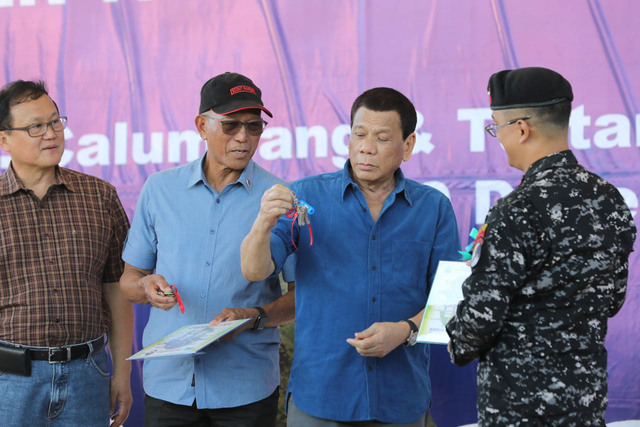 TOP ADVISERS. Former military generals Eduardo del Rosario (left) and Delfin Lorenzana are in President Rodrigo Duterte's Cabinet. Malacañang photo
TOP ADVISERS. Former military generals Eduardo del Rosario (left) and Delfin Lorenzana are in President Rodrigo Duterte's Cabinet. Malacañang photo
The appointment of more retired soldiers and police generals to civilian government posts coincided with the departure of Duterte’s Leftist appointees.
Former anti-poverty commission chief Liza Maza
resigned after murder charges were filed against her and 3 other Leftists (the charges were eventually dismissed). Duterte had
fired Labor Undersecretary Joel Maglunsod, apparently for his ties with the Left.
Yet it was also in 2018 when Duterte moved against the military’s own. He brazenly issued a
proclamation attempting to void Senator Antonio Trillanes IV’s amnesty and put him behind bars. The attack on Trillanes, a former Navy officer, ruffled some feathers in the military and led to a rare presidential
outburst directed at troops.
Rappler looks at Duterte’s increasing dependence on the military institution and how this may be impacting his governance style and Philippine democracy as a whole.
Militarizing the bureaucracy
Of the roughly 30 members of the Duterte Cabinet, 8 are retired military men and one is an ex-police official – or a 3rd of the Cabinet. Many of them are former military chiefs.
They are:
- Interior Secretary Eduardo Año (former AFP chief)
- Defense Secretary Delfin Lorenzana
- Social Welfare Secretary Rolando Bautista (former Army chief)
- Environment Secretary Roy Cimatu (former AFP chief)
- Information and Communications Technology Secretary Gregorio Honasan
- Presidential Adviser on the Peace Process Carlito Galvez Jr (former AFP chief)
- Housing and Urban Development Coordinating Council Chairperson Eduardo del Rosario
- Technical Education and Skills Development Authority Director-General Isidro Lapeña (former police general)
- National Security Adviser Hermogenes Esperon Jr (former AFP chief)
Several times in the year, Duterte found it necessary to explain his preference for former military men when it comes to government work. Military men, unlike “bureaucrats,” never debate with him, he said. They are action men who will execute orders faithfully and promptly.
“Who dug through the landslides in Cebu? Who? The military. Military, they are utility boys. They are the first to die. They are the ones whom you call to pave the road if no one else is there to pave it,” was how he put in in a speech on October 31.
He sneered at civilian government officials.
“Talagang dedebatehin ka sa mga gagong ‘yan. Kung may ipagawa ka, kung ano pang idagdag na pangpahirap. Instead of just looking for a way to tailor-fit or to dovetail the project, marami ang ano,” he said on December 5.
(The fools will really debate with you. If you have them to do something, they will add something to make it more difficult. Instead of just looking for a way to tailor-ft or to dovetail the project, they have so many things to say.)
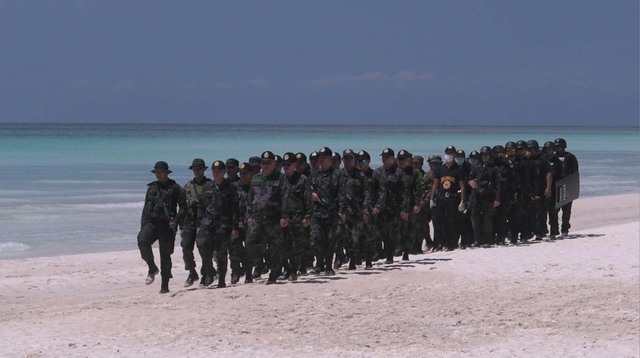 SOLDIERS IN THE BEACH. Soldiers simulate a terror attack and hostage-taking on the beaches of Boracay Island. Photo by Adrian Portugal/Rappler
SOLDIERS IN THE BEACH. Soldiers simulate a terror attack and hostage-taking on the beaches of Boracay Island. Photo by Adrian Portugal/Rappler
It’s for this reason, apparently, that Duterte put former AFP chiefs Eduardo Año and Roy Cimatu, now Cabinet secretaries, in charge of the 6-month Boracay rehabilitation. Though Tourism Secretary Berna Romulo Puyat and Public Works Secretary Mark Villar were also at the front lines of the effort, Duterte credited Año and Cimatu for the “successful” rehabilitation.
“Do you think Boracay would have been cleaned up if it weren’t for Año and Cimatu? Año is from the DILG and Cimatu was once assigned in Davao,” said Duterte on October 31 in Cagayan de Oro.
Marawi City would also supposedly have been worse off if he had not tapped former general Eduardo del Rosario as the rehabilitation czar.
“Then Marawi, there was a massive destruction. I got a general who was assigned in my city. Sabi ko (I said), ‘You fix it within 6 months.’ And he did. Kaya natapos (That’s why it was finished),” said Duterte.
While the government finally kickstarted the reconstruction of the city center last October 30, Del Rosario admits full rehabilitation won’t be completed until after a few years.
To obey, comply
Duterte’s preference for the military man likely emanates from a certain thinking of how soldiers operate.
Former national security adviser Jose Almonte told Rappler that, whether right or wrong, most people tend to believe this about soldiers: “A military is reputedly not conversant in economic, political, social-cultural matters. They are only experts in combat operations so by extension they are good in following orders. If you can manage people in combat well you can manage a situation well without combat.”
Even if a soldier is given a seemingly impossible task, the soldier will do everything to execute the order.
“That is the training of the military, to obey, to comply. They are not trained to complain,” said Almonte.
Such training is thought to apply to a soldier even after they retire and take over government posts, technically, as civilians.
But Almonte sought to dispel the idea that all soldiers don’t engage in debate. After all, he pointed out, military generals must also consult with junior officers assigned to intelligence, operations, and logics as well as other sectors like local governments before deciding on a course of action.
The only difference with the military is, “Once a decision is made after that debate, everybody follows. Anyone who will not follow will be court martialed for disobedience,” said Almonte.
Military response as default?
After back-to-back
shabu-smuggling scandals in the BOC, Duterte had had enough. Apart from changing the bureau's leadership, Duterte revealed his trump card: the military.
Last October 28, he ordered a military “takeover” of the controversy-mired bureau.
But after
pushback from critics, Duterte
clarified his order. Soldiers would not take over BOC posts but would supervise personnel to ensure contraband don’t slip in again.
Duterte felt there was another pesky problem requiring the military’s assistance: corrupt cops. He said he wanted the
elite Scout Rangers to monitor policemen who insist on visiting casinos.
For Ateneo de Manila political science professor Carmel Abao, this shows the military response is Duterte’s "default."
“His default is the armed institutions, instead of civilian institutions,” she said.
He might also be turning more and more towards the military because he knows he is running out of time. By end-2018, Duterte will be approaching the halfway mark of his 6-year term. Duterte has already admitted he “underestimated” the “magnitude” of the drug problem and extent of police corruption.
“It could be a function of age. You get impatient. You don’t have time. It might also be a function of machismo,” said Abao.
That Duterte has asked for yet another extension of his martial law declaration in Mindanao shows he wants to “normalize” the militaristic response to the region’s security problems, said Abao. The specific clash that necessitated the declaration, the Marawi siege, may be over but Duterte still thinks military rule is necessary to solve the remaining problems.
Davao days
To understand Duterte’s dealings with the military and police, one must look to his
days as Davao City mayor.
He himself admitted he draws on his experience in Davao for his work as president. In fact, many of his appointees now were once soldiers and policemen he worked with when he was mayor: Del Rosario, Lorenzana, National Intelligence Coordinating Agency chief Alex Monteagudo, Technical Education and Skills Development Authority boss and former customs commissioner Isidro Lapeña, among others.
Duterte’s sister Jocellyn Duterte, in a previous interview with Rappler, recalled Duterte had been comfortable with law enforcers and military men from a young age.
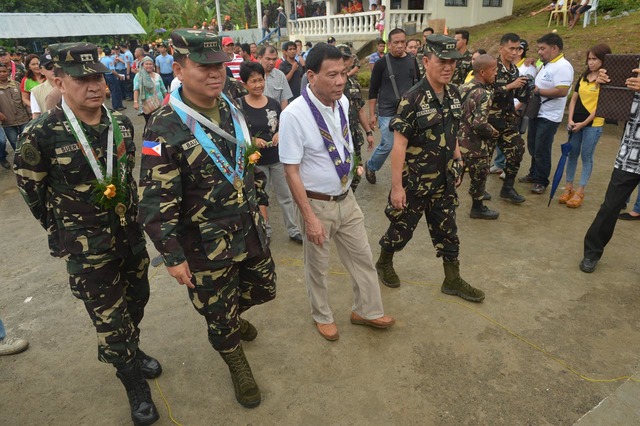 MAYOR DAYS. As Davao City mayor, Rodrigo Duterte cultivated his ties with soldiers and policemen assigned to his city. File photo from Davao City Government
MAYOR DAYS. As Davao City mayor, Rodrigo Duterte cultivated his ties with soldiers and policemen assigned to his city. File photo from Davao City Government
He had often hung out with security men assigned to him while his father was governor of the undivided Davao region. Throughout his life, Duterte would come to appreciate the compansionship of police or military types. His first assistant, Jimboy Halili, the man Bong Go replaced, was a former lieutenant and aide of a Philippine Constabulary officer.
Duterte’s longtime driver in Davao City is a policeman. Even one of his nurses is a policewoman.
As mayor, Duterte would come to rely on the police and military more and more as he tried to stop the tide of violence engulfing Davao. Clashes between communist groups and hit squads in the early days of Corazon Aquino’s administration washed the city’s streets in blood.
The crisis called for a violent solution and Duterte was there to provide it.
“He was mayor for 23 years in a frontier city with a long history of violence so an important aspect of his leadership I think was how to deal with those kinds of conflicts, literally involving violence force, coercion,” said former University of the Philippines political science department chairman Temario Rivera. (READ:
How Duterte handles crisis, controversy during his presidency)
Talk to many Davaoeños and they will say they appreciated Duterte’s approach. It brought peace and security.
As mayor, Duterte showered the police and military with incentives – monthly allowances, fish and rice, payment of hospital bills, among others.
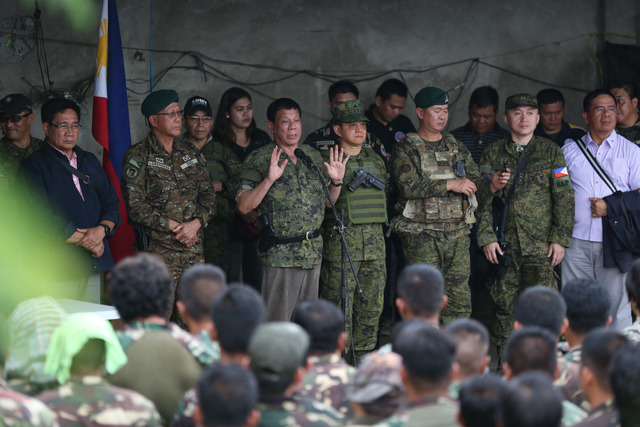 TALK TO TROOPS. President Rodrigo Duterte addresses soldiers in Marawi City a month before its liberation from extremist groups. Malacañang file photo
TALK TO TROOPS. President Rodrigo Duterte addresses soldiers in Marawi City a month before its liberation from extremist groups. Malacañang file photo
Throughout his presidency, Duterte regularly visited military camps and even active warzones to distribute Gloc pistols, watches, smartphones, and cash. He succeeded in increasing the take-home pay of soldiers and policemen.
Two decades after confronting Davao City’s bloodbath, Duterte is still governing the much bigger, noisier Philippine democracy as a frontier town mayor.
It’s partly because the militaristic response is what Duterte knows best. It’s his comfort zone.
“That’s his style of governance. That’s even his style of patronage. If you vote for him, he will promise you security, safety,” said Abao.
His top concerns as President are framed as issues requiring a violent response – the crackdown on illegal drugs and criminality.
While the two can be approached in different ways – drug addiction as a health issue and criminality as a poverty issue – Duterte sees them primarily as security concerns that require armed coercion.
The cost: Civilian institutions
When an increasingly desperate President turns to soldiers and police for the task of governing, what happens to democracy and democratic institutions?
“The casualties are the political institutions. There is also less room for citizens to play a role,” said Abao.
Politics, in a democracy, is about “dealing with constraints,” such as an independent Congress and judiciary, overlapping and conflicting interests of a myriad of stakeholders and sectors, and reaching a compromise to get something done.
This takes a lot of consultation and consensus-building, no doubt exasperating for an “action man.”
Abao fears that a default militaristic response would be used to take “shortcuts” and implement “simplistic” responses to complex issues – thereby limiting the space for real political discourse.
In a smaller base like Davao City, Duterte might be able to get away with it, but not on the national stage.
“In a local setting, you can afford to be simplistic in how you deal with problems because it’s a smaller population, more homogenous population. When you’re a national figure, you have to go through so many levels. You’re talking about an entire Senate, an entire Congress,” said Abao.
Duterte has already displayed, in dramatic fashion, his aversion to dissent, an indispensable component of real political discourse.
He has publicly insulted critics – from world leaders to a Supreme Court chief justice.
He has threatened media outlets critical of him, threats that were quickly followed by legal cases.
He has sent one opposition senator to jail and is determined that another meets the same fate.
Many fear Duterte’s increasing reliance on the military is another redflag for authoritarian tendencies and a future when soldiers will once again be weaponized against the people.
But Almonte, a former soldier who served in top civilian posts, is not worried about the Philippine military.
While the Philippines has a history of presidents using soldiers for less than noble deeds, the Armed Forces today will withstand such attempts.
Without referring to Duterte specifically, Almonte said, “The collective sense of the military is to protect the nation and the state…Even if you multiply their salary 1,000 times, in the end, once the people and the state are compromised by anybody, whether it is the president or an external invasion, the Armed Forces and the police will always side with the people.”
As time ticks for the Duterte presidency, Philippine democratic institutions will be tested against an impatient commander-in-chief determined to do things his way or not at all.
